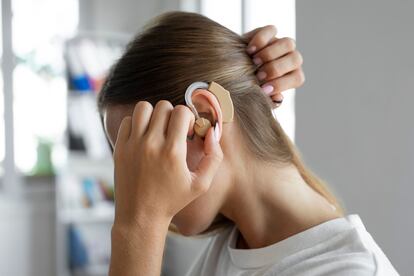Deafness no longer affects only older people: ‘The average age has decreased by about ten years’
Specialists discover that people coming to consultations with ear discomfort are getting increasingly younger

Hearing is not lost overnight. The damage is usually gradual and it is common for this change to go unnoticed, especially when it begins. Firstly, it becomes difficult to hear a conversation in a very noisy environment, such as a crowded public space, a meal in a restaurant, a chat between co-workers in the office, or while walking down the street. The discomfort worsens until it is difficult to hear even loud voices, and finally, the mild hearing loss turns into deafness, meaning the damage is total and irreversible. In most cases, the cause is simply age: 12.7% of the world’s population over 60 years of age has moderate hearing loss, a percentage that rises to 60% at age 90, according to data from the World Health Organization (WHO). However, specialists have begun to notice that increasingly younger people are coming to consultations complaining of ear discomfort.
“The average age has dropped by about ten years. If in the past patients began to have hearing problems at the age of 70-80, it is now a decade earlier″, says Mari Cruz Iglesias, head of the Otorhinolaryngology (ENT) unit at the San Carlos Clinical Hospital in Madrid. The doctor explains that the hearing loss and deafness in these patients has nothing to do with the natural aging of the inner ear — which is known as presbycusis — but depends on prolonged exposure to noise. “Traffic, movies, concerts, and nightclubs. Even when we go shopping, there is music in the stores. It is a life lived with a lot of acoustic trauma going on at all times,” Iglesias explains.
The WHO predicts that by 2050, around 2.5 billion people in the world — in other words, one in four — will have some degree of hearing loss. Although the rising numbers are mainly due to demographic changes, such as the growth of the elderly population worldwide, there are other factors that influence a person’s hearing health throughout their life. And, as a matter of fact, one of the main agents is excessive noise.
“Unfortunately, we don’t have objective data, because exhaustive studies have not yet been carried out on this topic,” otolaryngologist Miquel Quer, from the Sant Pau hospital in Barcelona acknowledges. “But it is evident that we live in a society where there is a lot of noise and we have known, for many years, that noise brings about presbycusis. It is not surprising that patients are starting to get younger and younger.”
Typically, exposure to a sound intensity of more than 80 decibels for periods of more than 40 hours a week can irreparably damage the sensory cells of the inner ear. Traffic on a busy city street can reach 60 decibels ; the full dining room of a restaurant can reache 80; the noise of a motorcycle can reach 90, and the music in a nightclub can hit 100. The European Agency for Health and Safety at Work estimates that between 25% and 33% of workers in Europe are exposed to a high level of noise, for at least a quarter of their working day.
The danger of personal listening devices
In addition to environmental and work factors, Quer focuses on recreational environments, where the biggest problem is prolonged and high-volume listening to music through personal devices, such as earphones and headphones. An important scientific review published last November in the British Medical Journal Global Health estimated that between 670 million and 1.35 billion teenagers and young adults in the world are at risk of hearing loss due to exposure to unhealthy listening habits.
The problem with headphones lies mainly in two factors. Firstly, the using them for prolonged periods in environments that are already very noisy, such as streets crowded with people and traffic, and the lack of distance between the transmitter and the ear canal. “Headphones will undoubtedly be the cause of hearing problems in the next generations of patients who, within 10 or 20 years, will begin to realize that they have lost hearing ability,” explains Jacinto García Lorenzo, head of service at the Mar de Mar hospital in Barcelona.
Meanwhile, the ENT doctor acknowledges that he has already begun to treat young people who come to his office for cases of presbycusis. “It would not be an exaggeration to say that middle age has begun to get younger. It is no longer just our grandparents who were deafened by noises at work. There is a whole generation that is now reaching old age and that already has serious problems with their hearing,” he explains. “The prevalence of hearing loss is increasing in the Western world, and Spain is no exception.”
Misuse of personal listening devices is not the only factor that is causing serious hearing problems in increasingly younger patients, although it is definitely the newest. Eduardo Raboso, head of ENT at the La Princesa Hospital in Madrid, explains that among cancer patients the incidence of deafness is beginning to go up, due to the medications used in chemotherapy that can be harmful to hearing. “These are treatments are essential to cure the patient today, but a few years ago they were not so widespread among the population,” the doctor says.
Lack of data and awareness
One of the main problems that experts point to is the lack of data when it comes to quantifying how many patients “in the average age of 50” have some type of hearing impairment. “The feeling is that people go for consultation when it is too late, when they have serious problems and not when they begin to realize that something is not working as it should,” explains Luis Lassaletta, head of Otology at the Spanish Otorhinolaryngological Society (SEO) . “When they finally turn to a specialist, the only thing that can be done is to put in a cochlear implant, because they already have cases of severe or profound hearing loss.”
Before this resource is needed — used by around 20,000 patients in Spain, according to data from the SEO — specialists insist on going for a consultation as soon as possible. “Acoustic trauma is caused by compound damage over long time. Everything that has been lost is impossible to recover, so the only thing that works is to preserve the hearing that remains and eliminate listening habits that are dangerous for hearing health,” Lassaletta insists.
Sign up for our weekly newsletter to get more English-language news coverage from EL PAÍS USA Edition
Tu suscripción se está usando en otro dispositivo
¿Quieres añadir otro usuario a tu suscripción?
Si continúas leyendo en este dispositivo, no se podrá leer en el otro.
FlechaTu suscripción se está usando en otro dispositivo y solo puedes acceder a EL PAÍS desde un dispositivo a la vez.
Si quieres compartir tu cuenta, cambia tu suscripción a la modalidad Premium, así podrás añadir otro usuario. Cada uno accederá con su propia cuenta de email, lo que os permitirá personalizar vuestra experiencia en EL PAÍS.
¿Tienes una suscripción de empresa? Accede aquí para contratar más cuentas.
En el caso de no saber quién está usando tu cuenta, te recomendamos cambiar tu contraseña aquí.
Si decides continuar compartiendo tu cuenta, este mensaje se mostrará en tu dispositivo y en el de la otra persona que está usando tu cuenta de forma indefinida, afectando a tu experiencia de lectura. Puedes consultar aquí los términos y condiciones de la suscripción digital.









































